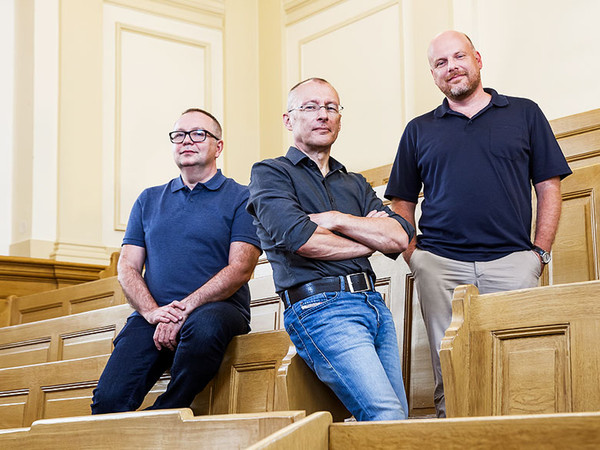Better equipment for Czech workplaces, articles in renowned journals, new research teams, and support for young scientists are the goals of the National Institute for Cancer Research (NICR), the largest project in Czech academic oncology. It also involves Olomouc’s Institute of Molecular and Translational Medicine (IMTM), which is part of the UP Faculty of Medicine & Dentistry and UP CATRIN. In 2023, significant achievements were made in relation to these goals, and one of the ambitions the institute entered the new year with was to focus on the popularisation of oncology research.
“We are succeeding in fulfilling exactly what the NICR was founded to do – to interconnect Czech oncology research and build synergies, thanks to which we are improving the conditions for scientific work that should result in discoveries useful for the diagnosis and treatment of oncological diseases,” said NICR Director Aleksi Šedo, evaluating the year 2023.
According to him, investments in technological equipment at the workplaces in Brno, Olomouc, and Prague are good examples of that. Devices allowing a more precise view into what is happening inside cells or sequencing the genome bring scientists closer to answering questions on how to better target negative processes such as cancer in a diagnostic or therapeutic way. “In the new proteomics lab, we are experimentally studying the proteins present in cells, tissues, and blood in relation to mechanisms of cancer onset and development. The instrumentation of the laboratory is unparalleled not only elsewhere in the Czech Republic but anywhere in Central or Eastern Europe. We are able to detect and quantify thousands of proteins in a single measurement, which allows us to work faster. At the same time, we can see exactly what processes are taking place in the cell at any given moment, giving us a comprehensive view of the issue under study,” said Šedo, describing the Proteomics Laboratory at the First Faculty of Medicine, Charles University, Prague.
One of the most advanced mass spectrometers, which has expanded the possibilities of proteomic and metabolomic studies in particular, is now at their disposal in the IMTM laboratory, too. This workplace focuses mainly on the analysis of cancer biomarkers from human fluids and tissues collected in non-invasive ways – such as from breath or tears. There are also new additions at the Brno branch of the NICR – the workplace of CEITEC and Masaryk University – where they have installed a modern sequencing system able to “read” the entire human genome efficiently, and at low cost. It can read up to 48 genomes concurrently in two days, something not previously possible.
The interconnection of the workplaces into a single unit allows the scientific teams to share information and technological capabilities more efficiently. “The excellent results of the scientific teams involved in the NICR have resulted in publications in top peer-reviewed journals such as Nature Communications, Blood, Journal of Clinical Oncology, Clinical Cancer Research, and Nucleic Acid Research. This confirms that oncology research in the Czech Republic is world-class,” said Ondřej Slabý, NICR Scientific Director. The NICR has also established close cooperation with medical infrastructures supporting translational research (EATRIS), clinical research (ECRIN), and biobanking (BBMRI).
Last but not least, in 2023 the NICR also organised two international summer schools, the international conference Czech Annual Cancer Research Meeting, and the first OncoPatient conference, where academics meet patients and patient organisations. “One of our goals was also to support young talents via developing academic oncology. That is why we are pleased that eleven colleagues have defended their doctoral theses under the supervision of scientists from the NICR, three junior research groups have been established, and two doctoral study programmes have been opened: Experimental and Clinical Oncology at Charles University in Prague, and Molecular and Translational Medicine at Palacký University Olomouc,” said NICR Medical Director Marián Hajdúch from the UP Faculty of Medicine and Dentistry.
In 2024, NICR also wants to focus on popularising cancer research among the public and to encourage their interest in it. Among other things, NICR is preparing projects for high school students, their teachers, and budding scientists.

The National Institute for Cancer Research was established in 2022 as part of the Programme for Public Research & Development Support for Priority Areas of Medical Sciences and Related Social Sciences – EXCELES, which is funded by the National Recovery Plan. The institute brings together seventy excellent research teams from workplaces in Prague, Brno, and Olomouc. For more information, see www.nuvr.cz/en/.
